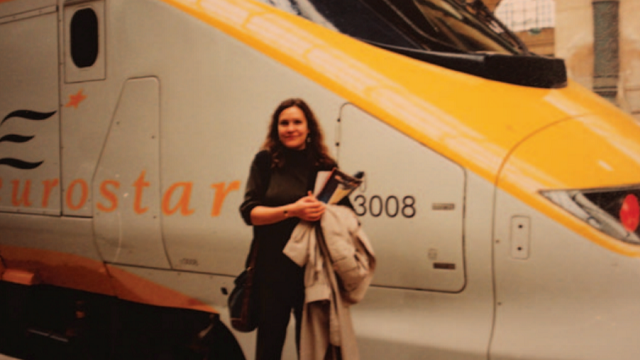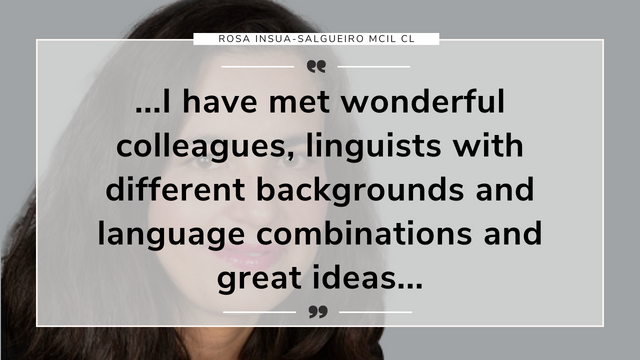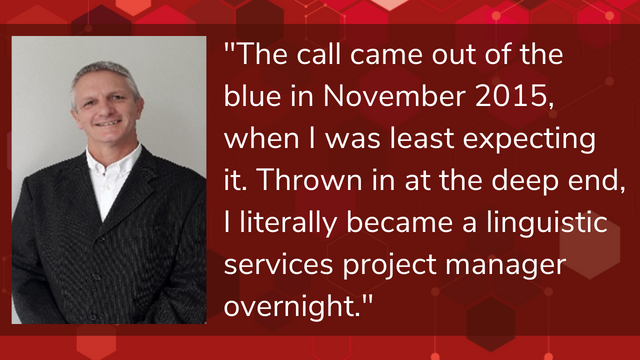-
QUALIFICATIONS
- For Linguists Worldwide
- For UK Public Services
- Preparation
- Policies & Regulation
-
MEMBERSHIP
- Join CIOL
- Professional Membership
- Affiliate Membership
- Chartered Linguist
- Already a member?
- Professional conduct
- Business & Corporate Partners
-
LANGUAGE ASSESSMENTS
- English
- All Other Languages
-
CPD & EVENTS
- Webinars & Events
- CIOL Conferences
- Networks
- CIOL Mentoring
-
NEWS & VOICES
- News & Voices
- CIOL eNews
- CIOL Awards
- The Linguist Magazine
- Jobs & Ads
-
RESOURCES
- For Translators & Interpreters
- For Universities & Students
- Standards & Norms
- CIOL & AI
- All Party Parliamentary Group
- In the UK
- UK Public Services
- Find-a-Linguist
Four decades in languages
As she retires as CEO, Ann Carlisle considers developments to languages in the UK during a 40-year career, and what they mean for the present and future.
 The world has changed dramatically and probably irreversibly in recent months, but looking back on a language career spanning 40 years – the last seven with CIOL – change has been a constant backdrop. The recent report ‘Towards a National Languages Strategy’ was a sharp reminder of the need for sustainable change, as it was only in 2002 that the last National Languages Strategy had provided a wake-up call for a national effort to stop language decline in the UK.
The world has changed dramatically and probably irreversibly in recent months, but looking back on a language career spanning 40 years – the last seven with CIOL – change has been a constant backdrop. The recent report ‘Towards a National Languages Strategy’ was a sharp reminder of the need for sustainable change, as it was only in 2002 that the last National Languages Strategy had provided a wake-up call for a national effort to stop language decline in the UK.
Working as a business development officer for languages at the Polytechnic of North London in 1989, it was a call from British Rail that set my career path in motion and gave it focus: “Is it easier to take a train driver and teach him French, or take a linguist and teach him how to drive a train?” (I’d add “or her”.) The interplay of work and languages has been at the core of my professional activities ever since and this nuanced question still touches many of the issues CIOL works with today.
The joy of a language career is the interface with many other worlds. I hear from linguists whose professional lives have touch points with prominent politicians, the wine industry, our law courts, travel and aviation, nuclear power, the Olympics, to name just a few. If I hadn’t been a linguist I would likely never have travelled through the Channel Tunnel in the cab of a Eurostar, sat inside the Ministry of Foreign Affairs in Tehran or been held in a central London police cell as a detainee (simulation only!). Yet against this varied and wide-ranging landscape of opportunity, energising and motivating young people to learn languages remains a challenge.
The value of language skills and the benefit they bring to the UK, economically, socially, politically and culturally, has a comprehensive evidence base. This is shown in significant reports such as ‘Lost for Words: The need for languages in UK Diplomacy and Security’ (2013) and ‘Born Global’ (2016) from the British Academy; ‘Languages for the Future’ (2017) from the British Council; and ‘The Value of Languages’ (2016) from the University of Cambridge. There are many more. As the Chartered professional body for languages, CIOL has a leading and multi-faceted role to play in helping to reverse the alarming decline in languages and the inevitable future gap between language demand and supply.
Across schools, following the removal of languages as a compulsory subject from the post-14 curriculum in 2004, the numbers studying languages have fallen dramatically, not only across state education but also within the privileged context of private education. The diminishing pipeline of language learners emerging from schools, combined with increasing economic imperatives for universities, has led to specialist language departments reducing in number from over 90 at the end of the 1990s to just over 60 by 2019. The number will very likely drop further.
In contrast, a shift has taken place in language centres, which have attracted rising numbers of students from other disciplines. They see the addition of a language as value added to their qualification in subjects as far ranging as engineering, law, sports science and marketing. With Brexit just around the corner and Covid impacting on the home jobs market, it’s easy to understand why students are looking for skills that they can market beyond the formal boundaries of the UK and that will set them apart from their professional peers as they embark on their career journeys.
Pace of change
Much the most significant change has come from advances in technology and no more so than in the field of translation, where desk-working, traditional practices and dictionaries have been swapped for alternative translation-related activities and innovative technologies. Talk is now of terminology tools, post-editing, localisation, file transfers and workflows. Even machine translation sounds a little passé, and long gone are the Mondays I’d spend translating referees’ reports from international football matches, formatted in Word, printed and mailed back to the Football Association!
Interpreting technology is a game-changer but takes something important away from what is essentially a people profession, particularly as the pace of change intensifies as a result of the pandemic. Matching demand to supply no longer relies on geography, benefiting those that require fast access to rare languages, and interpreters who seek same-day assignments in different locations. The move from individual to corporate activity has facilitated the creation of mega-suppliers who now dominate the market, but pay, as well as terms and conditions, has suffered.
Outsourcing is a fact of 21st-century life and another change the profession must adapt to. The major UK framework providers have experienced a difficult learning curve, but there are positive signs that qualifications are once again being recognised and that the professionalism of our practitioners is being valued. The new national police framework for language services is significant in this respect and CIOL is proud to have been part of their engagement profile.
I feel immensely honoured to have finished my career leading the chartered body for the profession and representing such a talented body of linguists and language practitioners. Eurostar chose to ‘take a driver and teach them French’. I never encountered a more motivated group of learners, who saw acquiring the language as the route to their own career pinnacle – carrying passengers under the Channel and safely across French and Belgian rail networks to Paris and Brussels.
Reproduced from The Linguist, 59/5
Filter by category
More
The Chartered Institute of Linguists (CIOL), Incorporated by Royal Charter, Registered in England and Wales Number RC 000808 and the IoL Educational Trust (IoLET), trading as CIOL Qualifications, Company limited by Guarantee, Registered in England and Wales Number 04297497 and Registered Charity Number 1090263. CIOL is a not-for-profit organisation.







